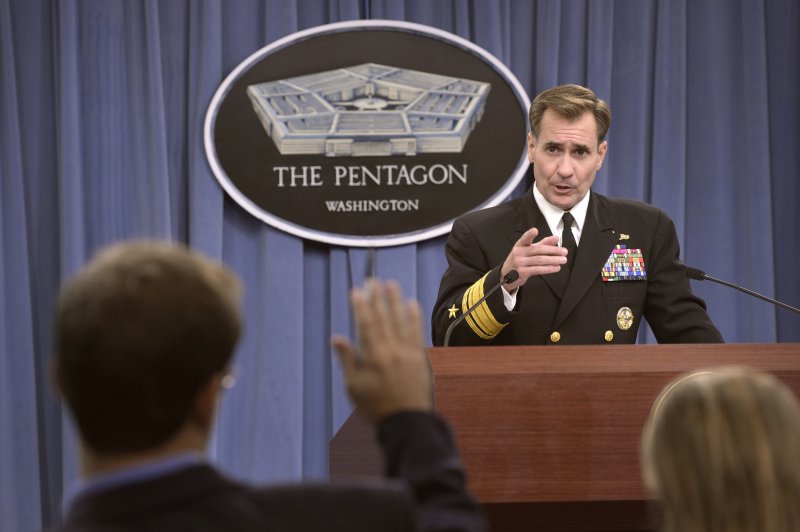U.S. Navy Rear Adm. John Kirby, the Pentagon press secretary, gives a briefing and answers questions for the media on events within the Department of Defense, the Middle East and Africa during his weekly press conference at the Pentagon in Arlington, Va., Oct. 3, 2014. On June 9, 2015, Kirby told MSNBC that efforts in Iraq against the Islamic State could take three to five more years. File photo courtesy the U.S. Department of Defense.
WASHINGTON, June 9 (UPI) -- U.S. Navy Rear Adm. John Kirby on Tuesday said it would take three to five more years to defeat Islamic State forces in Iraq.
The Pentagon spokesman's comment came one day after U.S. President Barack Obama, speaking at a G-7 summit in Germany, said the U.S.-led coalition in Iraq lacked a "complete strategy" for training and equipping Iraqi forces.
Speaking to MSNBC, Kirby said the way forward against IS must be an international coalition effort that is not only military in nature.
"Even if we were just talking about this from a military perspective -- and I know we're not, but let's say we were," Kirby said. "It's still going to take three to five years. It's going to take a while. This is not something that's going to be solved overnight, and I think all of us need to have some strategic patience here as we work our way through it."
He said the effort "has to be owned by the Iraqis."
"And yes," Kirby added. "A representative inclusive government is new territory for them. There's no question about that. But Prime Minister [Haider] al-Abadi is making the right decisions; he's moving in the right direction. We're committed to helping him in that regard."
On Monday Obama said the U.S.-led coalition did not "yet have a complete strategy because it requires commitments on the part of the Iraqis, as well about how recruitment takes place, how that training takes place."
The president told reporters in Germany he had discussed an improved training strategy with Abadi but that the two had not come to an agreement, the Los Angeles Times reports.
The president's remarks follow last month's fall of the Iraqi city of Ramadi to IS militants, who sent Iraqi soldiers, police officers and allied tribal fighters fleeing from their positions.
They also came one week after a 22-nation security conference in Paris in which Abadi said Iraq needed more support against IS forces, whose advance into Iraq he called "a failure on the part of the world."
"Air support is not enough," the Los Angeles Times quoted Abadi as saying last Tuesday. "There is too little surveillance. [IS forces are] mobile and move in very small groups."
At the same conference, the BBC quoted U.S. Deputy Secretary of State Antony Blinken as saying airstrikes and support for Iraqi ground forces are "the winning strategy," though he predicted it would be a "long campaign."
After the Sunni Islamic militants of IS swept into Iraq from Syria last summer, a U.S.-led international coalition formed to assist the Iraqis and bomb IS forces.
Known as Operation Inherent Resolve, the effort has resulted in at least 4,100 airstrikes in Iraq and Syria since the beginning of the campaign, according to U.S. Central Command, while 20 countries have donated more than 7.7 million pounds of equipment to Iraqi forces.
The State Department estimates the coalition has killed more than 10,000 IS fighters and reduced their territory by 25 percent since the beginning of the campaign last August.















